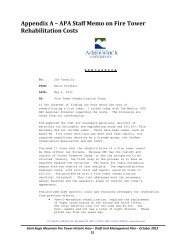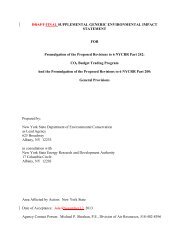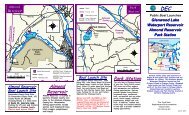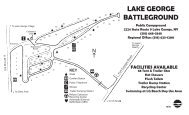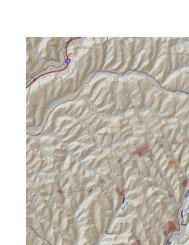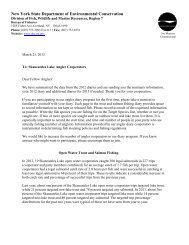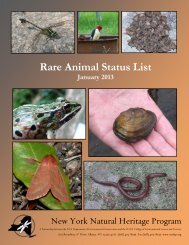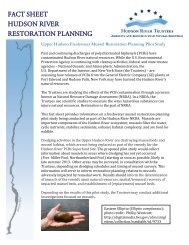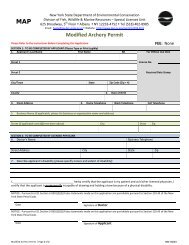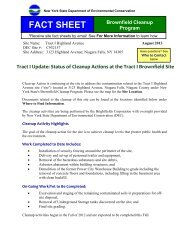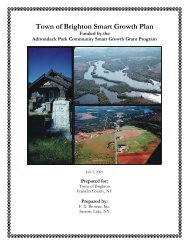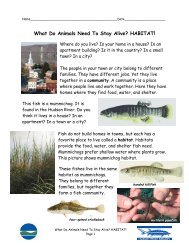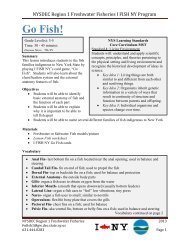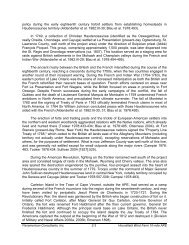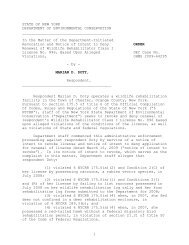2012-2013 Hunting & Trapping Regulations Guide - New York State ...
2012-2013 Hunting & Trapping Regulations Guide - New York State ...
2012-2013 Hunting & Trapping Regulations Guide - New York State ...
Create successful ePaper yourself
Turn your PDF publications into a flip-book with our unique Google optimized e-Paper software.
ͪ Possession tags must stay with the<br />
animal or pelt at all times, but they do<br />
not need to be attached to the pelt.<br />
ͪ Furbearer possession tags can be<br />
•<br />
obtained from your regional wildlife<br />
office (see page 8) or at www.dec.<br />
ny.gov/outdoor/29046.html<br />
STEP 2: Get your pelt sealed (see below).<br />
ͪ All Species<br />
» A completed furbearer possession tag<br />
must be submitted to obtain a plastic<br />
pelt seal.<br />
» You can give your pelts to another<br />
person (other than a taxidermist)<br />
so he or she can get the pelts sealed<br />
or get them skinned. You must give<br />
that person your trapping license<br />
or a copy of your license and your<br />
completed possession tags while he<br />
or she has your pelts.<br />
ͪ Otter, Bobcat, Fisher And Marten<br />
» Only authorized Department<br />
representatives can attach the plastic<br />
pelt seals to otter, bobcat, fisher or<br />
marten.<br />
» Call a regional wildlife office (see<br />
page 8) to make arrangements<br />
to get your otter, bobcat, fisher, or<br />
marten sealed. Seals for these species<br />
cannot be sent through the mail.<br />
» Prior to having a marten sealed, you<br />
must submit the entire carcass.<br />
BuYing and selling fur<br />
• Species requiring a pelt seal cannot be<br />
bought or sold or given to another person<br />
unless they have the plastic pelt seal attached.<br />
All other species may be bought, sold, and<br />
transported without restriction.<br />
• Furbearers may be bought or sold either<br />
skinned or unskinned.<br />
• People who buy fur do not need a fur buyer’s<br />
license in <strong>New</strong> <strong>York</strong>.<br />
rigHts Of trappers<br />
• No one may disturb a trap lawfully set by<br />
another person.<br />
• No one may remove a lawfully trapped<br />
animal from another person’s trap.<br />
• No one may harass a trapper while he or<br />
she is trapping.<br />
LiCense ResponsibiLities<br />
• A license is not transferable and can be used<br />
only by the person to whom issued.<br />
• A license to trap does not give the holder<br />
any right to go on private property without<br />
permission of the landowner.<br />
• It is illegal to refuse to show your license<br />
on demand to a law enforcement officer<br />
or the owner, lessee or person in control<br />
of the lands (or their designees) while on<br />
their property.<br />
inCidentaL and aCCidentaL<br />
CaptuRes of tRapped animaLs<br />
There are no provisions in the Environmental<br />
Conservation Law allowing trappers to possess<br />
animals that are taken outside of the open<br />
trapping season.<br />
You must attempt to release any animals that<br />
are accidentally captured when the season is<br />
closed or if the area is not open for trapping<br />
that species.<br />
If the animal is injured to the extent you<br />
believe it will not survive, humanely dispatch<br />
it. If you are not sure, contact a DEC Regional<br />
Wildlife Office for assistance.<br />
When you find an unintentionally captured<br />
animal dead in the trap, or when you must<br />
dispatch an unintentionally captured animal<br />
due to a serious injury, you may remove it and<br />
lay it in the vicinity of the trap. There are no<br />
legal provisions for you to keep it, and you<br />
may not possess it even to take it back to your<br />
vehicle without permission from DEC.<br />
DEC seeks information on all accidentally<br />
taken bobcat, otter, fisher, marten and other<br />
species of unusual nature. If the animals are<br />
dead, a DEC wildlife biologist may want to<br />
collect the carcass. The location and carcass<br />
data are the most valuable information DEC<br />
can obtain regarding the status of these species.<br />
Contact a Regional Wildlife Office or an<br />
Environmental Conservation Officer as soon<br />
as possible to report the catch. You will receive<br />
instructions on what to do and information<br />
to provide.<br />
possession of<br />
Road-kiLLed fuRbeaReRs<br />
If the trapping or hunting season is open for the<br />
species in a WMU, you may keep a dead furbearer<br />
Furbearer traPPING<br />
found on roads within that<br />
WMU. The requirements<br />
for possessing road-killed<br />
furbearers are the same<br />
as for trapping and<br />
hunting. For example,<br />
if you find a road-killed<br />
fisher in an area with an open fisher<br />
season and you possess a trapping license, you<br />
have to contact DEC for a pelt seal. If you find<br />
a bobcat, you can possess it if you have a small<br />
game or trapping license, but you also must<br />
have its pelt sealed.<br />
<strong>2012</strong>–13 HuNtING & traPPING GuIDe 53



